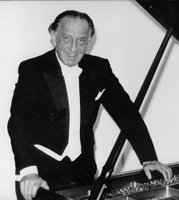Classy Classical CD Review: The 5 Browns
The 5 Browns are rising stars in the music world, appealing not only to Classical Music fans but also to other music lovers as well. The group is made up of five siblings, all of which attended Julliard. On their latest CD, Browns in Blue, we get a chance to hear them in music ranging from classical to jazz. There's even a track with The 5 Browns playing along through the magic of technology with Dean Martin singing Everybody Loves Somebody. Yet my favorite tracks on this CD remain the ones with solo performances by the Browns. This includes a beautiful interpretation of Brahms' most famous Intermezzo by Melody and a wonderful performance of Chopin's Nocturne in C minor by Gregory. While the tracks that contain all 5 Browns playing are typically exciting and fresh, the Classical purist may be a bit offended. For instance, in the opening 18th Variation from Rhapsody on a Theme of Paganini by Rachmaninoff, the addition of glissandi and other excessive notes at times seems to obscure the beautiful melody that has made the work so famous. However, the excerpt of An American in Paris by Gershwin with Chris Botti on trumpet is not to be missed and one of the standout tracks on the disc. All in all, I fully recommend this CD as I quite enjoyed listening to it and I'm sure you will as well. |
Subscribe: +Yahoo | +Newsgator | +Bloglines | +Rojo | +Google | +Newsburst | +AOL | +MSN | +Blogroll
Translate: Español | Deutsche | Français | Italiano | Português





Comments on "Classy Classical CD Review: The 5 Browns"
-
 Music Eloquence said ... (1:17 PM, January 09, 2008) :
Music Eloquence said ... (1:17 PM, January 09, 2008) :
-
 Classical Music Concert Listings said ... (8:51 AM, September 19, 2009) :
Classical Music Concert Listings said ... (8:51 AM, September 19, 2009) :
-
 Walt Ribeiro said ... (2:31 PM, December 03, 2009) :
Walt Ribeiro said ... (2:31 PM, December 03, 2009) :
-
 audio visual hire melbourne said ... (11:21 PM, December 09, 2010) :
audio visual hire melbourne said ... (11:21 PM, December 09, 2010) :
-
 Eloy Casas said ... (6:38 AM, April 16, 2011) :
Eloy Casas said ... (6:38 AM, April 16, 2011) :
-
 The Scholtes-Janssens Piano Duo said ... (6:06 PM, May 08, 2012) :
The Scholtes-Janssens Piano Duo said ... (6:06 PM, May 08, 2012) :
-
 All India Time Table & Results said ... (6:49 AM, March 19, 2022) :
All India Time Table & Results said ... (6:49 AM, March 19, 2022) :
-
 mgsu ba 1st year result said ... (3:47 AM, November 14, 2022) :
mgsu ba 1st year result said ... (3:47 AM, November 14, 2022) :
-
 Anonymous said ... (6:23 PM, December 14, 2022) :
Anonymous said ... (6:23 PM, December 14, 2022) :
post a commentI love these guys. I didn't know they'd come out with another cd. Thanks for the review also. I'm adding you as a link to my blog.
Thanks for this review. Much appreciated.
The 5 browns are doing a fantastic job. Sounds like their new album is pretty good!
Classical music is the art music produced in, or rooted in, the traditions of Western liturgical and worldly music, encompassing a broad period from roughly the 11th century to present times. The central norms of this tradition became codified between 1550 and 1900, which is known as the common practice phase.
I saw your page and I find it very interesting. I like that you included my blog under the heading of favorite blog is dedicated to collecting the best pianists in history, with links to live performances and links to his biography.
If you agree, just leave a comment in any of my posts, and I will include it to you.
My blog is:
www.pianistasdelmundo.blogspot.com
Thank you very much for your time.
Great! They were also in Holland last year on a festival. Thanks for posting. I'm actually writing about piano music myself. Mostly about my piano duo :)
http://scholtesjanssens.blogspot.com/
Keep up the nice work!
Thanks for sharing this with us...…this is really appreciating.
BSc 3rd Year Admit Card 2022
mgsu ba 2nd year result, mgsu ba 3rd year result.
This is the chad we miss